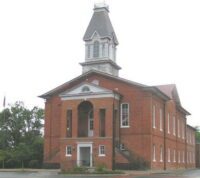PAGELAND
Webmasters Note: The information provided below was originally published on the website www.pigggenealogy.com that can now be found on the Internet Archive Wayback Machine. This information was used with permission of Mr. James Pigg with updates provided by Pattie Pigg.
The area now known as Pageland, has been continuously occupied since 1788, when Reece Shelby, Sr. received a land grant of 300 acres. He couldn’t resist the inducements offered by South Carolina, and left what is now Union County, North Carolina, to live the remainder of his life in Chesterfield County. Evan Shelby, Reece’s father, immigrated from Glamorganshire, Wales around 1730, and settled in Maryland. In the 1760’s, Reece and his brother, Moses, moved south to Anson Co., North Carolina. Both served during the Revolutionary War, but it was nephew Col. Isaac Shelby who won acclaim as one of the heroes of the Battle of King’s Mountain, when Patrick Ferguson and his followers were badly defeated. This is commonly referred to as the turning point of the Revolutionary War.
After Reece Shelby’s death (burial place unknown, but has a marker at Waxhaw Presbyterian Church with Andrew Jackson’s brothers and mother) the property went to his son, Reece Shelby, Jr. He in turn sold the land to John “Jack” Blakeney and became known as Blakeney’s crossroads. Blakeney sold some of the land to his brother, William, some to the east to Benjamin Vick, and some to the south to Ransom Pigg. After the War Between the States, Jack Blakeney, sold the rest, plus other accumulated property, to a carpetbagger named Henry J. Fox, who had been born in England. Fox bought thousands of acres of land for himself and as representative of a New York Mining corporation. The area was then known as Fox Place.
By 1900, Fox was long gone, coerced along by Klan activity, and once again what was to become Pageland was called Blakeney’s Crossroads. In the early 1900’s the only houses at the old crossroads were the old Fox house and the George Richard Sowell residence. Then it was decided that the Cheraw-Lancaster Railroad would be laid near the cross road and soon afterward the town was born. A depot was erected when the railroad reached there in 1904. The railroad itself continued construction to Crow/Burk but never reached its destination at Lancaster. By 1940, the railroad was no longer needed and was closed.
Chesterfield Land & Development held an auction on December 19, 1907, selling off lots for development, after they had hired Mr. Guess, an engineer, to lay out the town. The 157 inhabitants of the to be town petitioned for incorporation on December 3, 1907, which was granted January 11, 1908. Pageland was named in honor of Adolphus High Page, the C&L Railroad engineer responsible for the railroads placement through the Crossroads.
As the number of inhabitants implies, the town grew quickly with families that lived in the area and families from other counties. Families such as the Carpenters, Clarks, Tuckers, Catos, Mangums, Watts, Rallings, Ogburns, Autrys, Edgeworths, Myers, Smiths and others saw the opportunities the new town promised and invested.
Being at the crossroads, Pageland became a popular stopover for travelers. The Blakeney Hotel, which had been built in 1910, and originally housed a bank, feed store, and casket shop, was the place to stay. Known widely for its good food, it also was the home of a talking parrot. Unfortunately, the bird knew mostly profanity.
Pageland has continued its growth and somewhere along the way became known as the Watermelon Capitol of the World, holding an annual celebration in honor of the fruit in July, which brings in thousands of visitors. However, Pageland was not just an agriculturally based town; industry also found a home.
Today, the following industries are operating in Pageland: Aalbertis Integrated Piping Systems, Aviagen, CMTucker Lumber Company, Chesterfield Yarn Mills, Douglas Machine Shop, Dynamic Brands, OldCastle Lawn and Garden, PDQ South, Screwmatics, Southern Paint and Powder Coating, Titan Stainless, and Walmart Distribution Center.
The 2,556 residents of Pageland enjoy their small town atmosphere, but because of its close proximity with Monroe and Charlotte, North Carolina, lacks none of the benefits of a major city.
